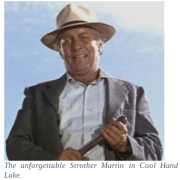Dialogue can be a writer’s best friend, or his worst enemy.
Stories can be broadly dissected into three distinctive parts – the narrative (scene-setting, and plot description), the action (who does what to whom) and dialogue (who says what). The latter segment is the one which appears to cause problems for many writers who struggle to get a balance between saying too much and not nearly enough.
Readers learn about characters more from what they have to say than from all the flowery descriptive bits about whether they have long hair, pouting lips, walk with a limp, or jump through burning hoops. Speech defines people, and provides insight to their views, their hang-ups, and their moods. Get it right and you’re on a winner. Underestimate it and suffer the consequences!
The end result of getting it wrong is what Strother Martin’s character said in Cool Hand Luke: “What we have here is a failure to communicate.”
There’s little doubt that films have immortalised some of the most memorable dialogue. In many cases, however, it was usually the screenwriter, rather than the original author, who came up with the great one-liners.
What would any of us give to have our names put to the following examples?
“And one day, not long from now, my looks will go. They will discover I can’t act, and I will become some sad middle-aged woman who looks a bit like someone who was famous for a while.” (Julia Roberts in Notting Hill).
“I’m scared of everything. I’m scared of what I saw. I’m scared of what I did, of who I am. And most of all I’m scared of walking out of this room and never feeling the rest of my whole life, the way I feel when I’m with you.” (Jennifer Grey in Dirty Dancing).
“Life is not the amount of breaths you take. It’s the moments that take your breath away.” (Will Smith in Hitch).
Naturally, we can’t sit around looking for that great Hollywood moment every time we try to put words into the mouths of our characters. Dialogue needs to be kept simple, but interesting. Don’t use it to have your hero and heroine discuss the merits of the weather, or who was evicted from last night’s episode of Big Brother! Use it to develop strong relationships between key players, while at the same time bringing out a new dimension to the characters they’re portraying.
Here are another few great examples of film dialogue transferring powerful messages about the way one character feels towards another:
“Fat, drunk, and stupid is no way to go through life, son.” (John Vernon in National Lampoon’s Animal House).
“You can’t handle the truth.” (Jack Nicholson in a Few Good Men).
In those few sentences we get a feel for the derision felt by one character about another. It would take at least a page of non-verbalised text to reach the same point – and it wouldn’t be nearly half as interesting.
There is an art to this kind of writing. They don’t pay screenwriters megabucks for nothing! The same is true in the newspaper industry where talented people are employed solely as headline writers. When they get it right, it’s worth it, none so than a memorable headline in the Sun newspaper in 2000 when a small Scottish football club by the name of Inverness Caledonian Thistle beat the mighty Glasgow Celtic in a cup match. The Sun headline screamed:
Super Caley Go Ballistic, Celtic Are Atrocious!
Needless to say, a framed copy of the newspaper headline adorns the walls of the club, long after everyone has forgotten what was actually written about the match!
Please don’t get the idea I’m suggesting we all go in search of that wow-factor piece of dialogue. No, keep it simple. If it happens, it happens.
And what if I never manage to find that one memorable, oft-to-be-repeated one liner? Frankly my dear I don’t give a damn!





Leave a Reply
Want to join the discussion?Feel free to contribute!